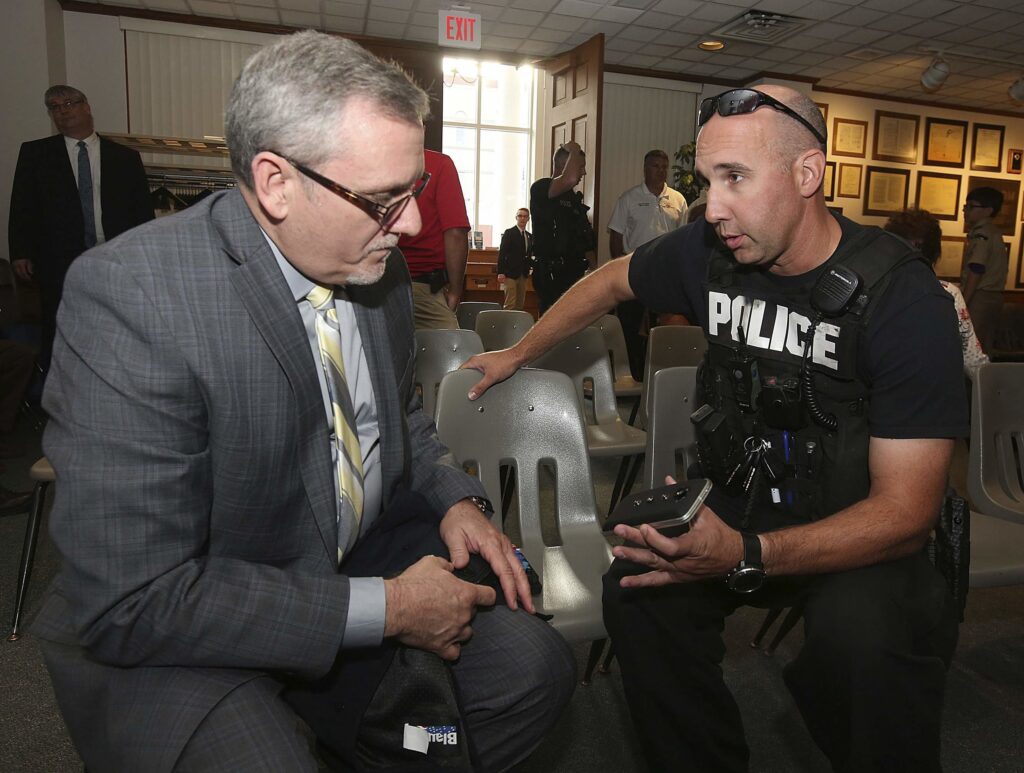By Doug Wilson Herald-Whig
QUINCY — Body cameras and car cameras selected for use by the Quincy Police Department were on display at City Hall on Monday during an informational meeting that led into the City Council meeting.

Police Chief Rob Copley said his department spent two years looking at camera styles before settling on BodyWorn sold by Utility Associates Inc., of Decatur, Ga. He said the camera system is a specialized smartphone that can be updated with programming and has long battery life and other features required by state law.
“We looked at other cameras and the number one problem was keeping it pointed where you want it when you’re running or wrestling with a suspect or just moving,” Copley said.
The unit that’s been selected goes into a zippered pouch on an officer’s uniform and points in the same direction at all times.
Mark Wood, account manager with Utility Associates, said the camera is based on the Motorola Moto E smartphone. Software turns the devices into cameras that have features that make them perfect as body-worn police cameras. The company also has car-mounted cameras and routers that have 128 gigabytes of storage.
“Our system puts the body camera inside the uniform. It can’t be ripped off,” said Wood, a retired Indianapolis police officer.
Illinois law requires a police camera to have a battery life that is longer than work shifts. Copley said QPD shifts can be 12 hours and the camera under review has enough battery life.
In addition, the GPS system on the camera can automatically turn the device on when an officer is within a certain distance from where a dispatcher has called for a response. The officer cannot shut it off.
“Every time it comes on, it shows everything that happened in the two minutes before it was activated,” Wood said.
Using smartphone technology, the cameras also can detect whether the wearer has fallen.
“Our system knows if you’re standing up or if you’re down. It can report an officer down, tell everyone who, where and turn-by-turn directions of how to reach that officer,” Wood said.
Microphones on the cameras also listen for gunshots and automatically start up, pulling up the previous two minutes of video, when a gunshot is detected.
During a foot pursuit, the system automatically maps out where an officer is running
The cameras can wirelessly upload footage, either to a cell tower or a car router. There’s no need to go to a specific site to upload the images.
Illinois law also requires that systems must have a system for redacting faces, license plates or nudity. The Utility Associates system has that capability. By circling a person’s face or an item, the designated part of that image can be blurred to preserve the privacy of people who are not accused of criminal activity.
Quincy aldermen are looking at a five-year lease of the cameras at a cost of $60,000 a year. This would include a bank of 50 cameras for cars and up to 73 body-worn cameras. The lease agreement is expected to come up for a vote in the City Council in the near future.
During the council meeting:
-
Aldermen voted to issue payment to the Quincy Landfills 2 and 3 Superfund for $76,000, to maintain the sites.
-
Four Points Land Surveying was hired to do $3,770 of surveying on 513-515 N. Fifth, 1300 N. Fifth and 1238 N. Eighth, with Quincy Housing Authority picking up an equal share before receiving transfer of the properties.
-
Aldermen agreed to renew a self-fueling permit for Dean Phillips for a one-time fee of $2,750 for the next five years.
-
The Quincy Art Center was granted permission to sell alcoholic beverages on the property at 1515 Jersey.
Source: Herald-Whig
